With the rise of online travel agents and travel aggregator sites, it’s now more important than ever for hotels to rank on Google for the keywords that match their accommodation.
As a hotel marketer, implementing travel SEO strategies offers you the chance to cut out the brokers and get your own website in front of potential customers.
In this comprehensive guide to SEO for hotels, I’m going to explain the exact methods you need to follow to maximize your chances of securing the top spots on Google search.
Each section will be broken down into manageable steps, and I’ll also include some general best practices to follow so that your hotel website is ready to compete on the search engines.
What is SEO for hotels?
It’s no secret that Google dominates our access to information and resources – in fact, it’s probably how you found this page. The travel industry is no exception, and online hotel bookings are increasing by more than 10% each year.
Search engine optimization (SEO) is a catch-all term to describe the process of optimizing your hotel website to rank highly for the phrases that travelers type on search engines, mainly Google. Which is important, because 75% of searchers never make it past the first page of Google.
The aim of a hotel SEO strategy is for your hotel website to appear in the hotel pack and organic results for keywords related to your offering:
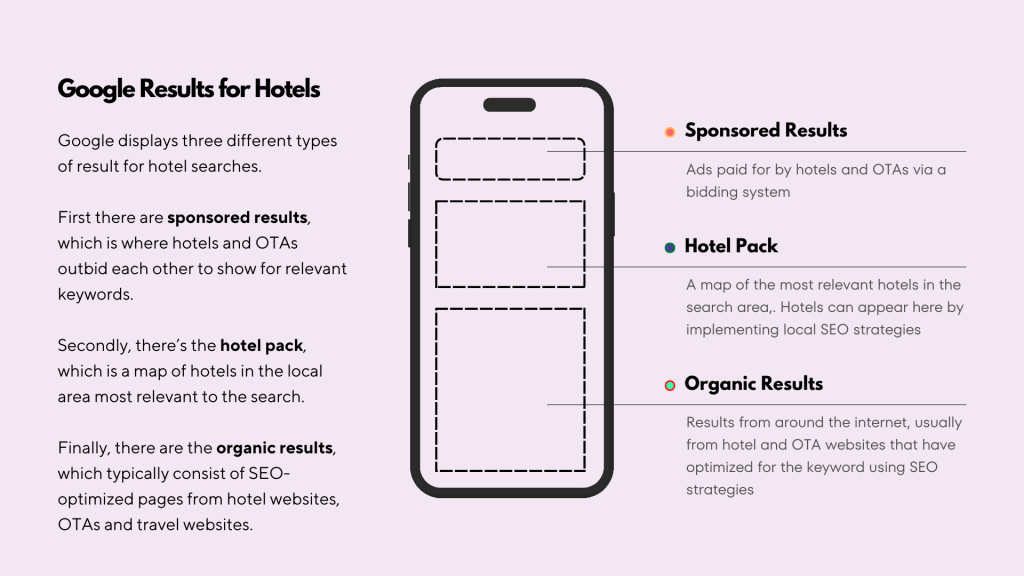
Whereas sponsored results require you to pay per click to your website, the hotel pack and organic results can continue to drive traffic for months and years after SEO work is carried out. This is what makes hotel SEO a more sustainable long-term investment than PPC.
Related articles: the complete guide to SEO for tour operators
How to find the best keywords for your hotel
As I’ve mentioned, SEO is about optimizing a website to appear in organic search results. When done correctly, it’s an effective digital marketing strategy that allows your customers to find you when they’re searching for a hotel that fits your description.
The building blocks of organic search are called ‘keywords’. Whether it’s a voice search, a desktop browser search or some words typed from a mobile phone, all Google searches start with a keyword, and the process of optimizing your website for organic search can just as easily be called the process of optimizing your website for a set of keywords.
The hotels that are most successful with SEO are the ones that find and optimize for keywords that are most relevant to their offering. These very specific keywords often have less competition than more general, broad match keywords. Let me explain this with an example:
If you were to type a keyword such as ‘hotel in london into Google, you’d be bombarded with paid ads, chain hotel listings, travel aggregators and OTA websites.
The reason for this is that ‘hotel in london’ is a highly competitive keyword, and there are lots of different entities, often with large marketing budgets, vying for the top Google positions on that keyword.
After sponsored results and the Hotel Pack, we can see the following organic results for this keyword:
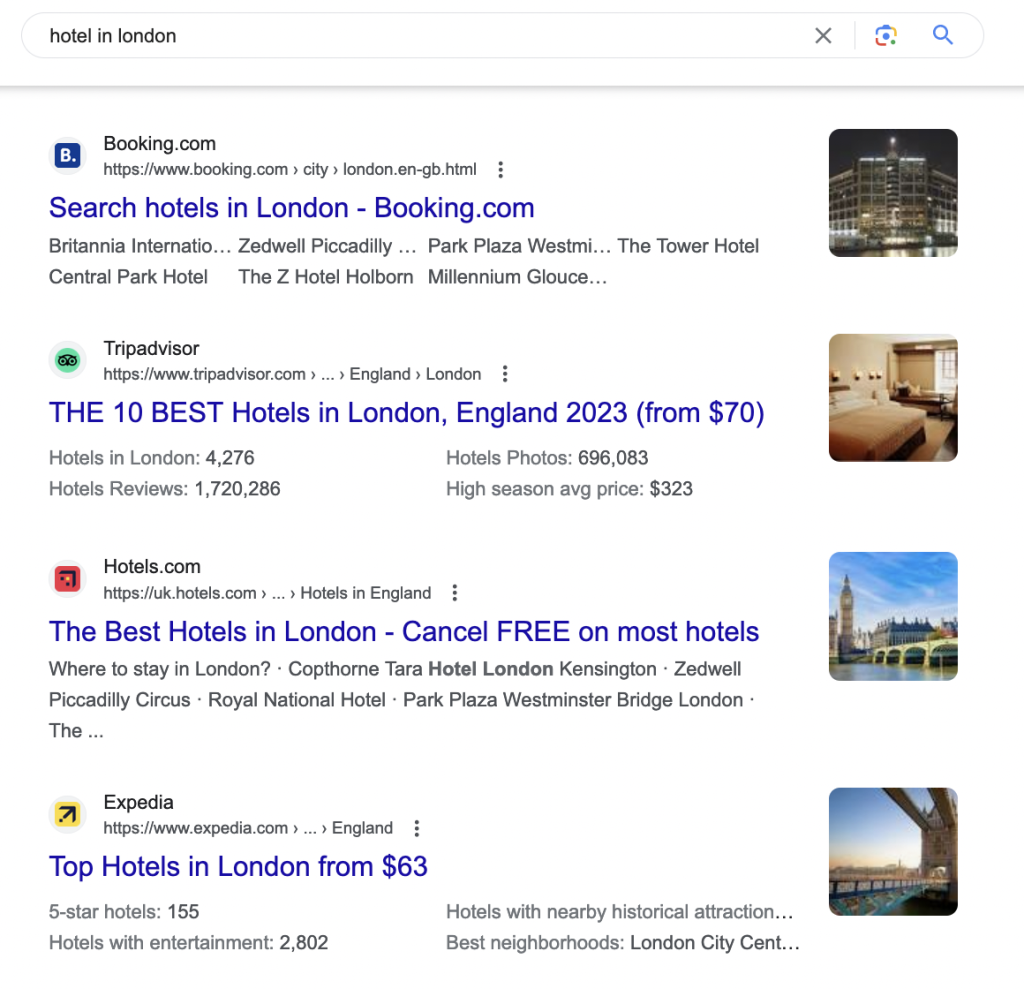
As you can see, the top organic positions for ‘hotel in london’ are dominated by results from Booking, Expedia and Tripadvisor. These are huge websites with a massive search presence.
If you’re a small-to-medium sized hotel in London, it’s going to take a huge amount of effort and expense to outrank these monster websites for this keyword.
But that’s fine, because we’re going to take a ‘back door’ approach by looking for more specific, less competitive keywords to target.
Step 1: Sketch some keyword ideas
The first step is to think about certain qualities that are specific to your hotel. This could be amenities like a swimming pool, rooms with a jacuzzi, rooms with a city view or an on-site restaurant. Make a list of them. Once you’ve jotted down some ideas, we’re going to find matching keywords that people search with the help of a keyword research tool.
SEMrush is an all-in-one marketing tool that I sometimes use for keyword research. You can sign up for a free trial (NB: we’re not affiliated!) to access the full features of SEMrush, carry out your keyword research, and cancel before the trial period has expired. I recommend this option for hoteliers who want to find out an initial batch of keywords to target; once you’ve done the research once, you’ll be more than set for at least a few months of work.
If you don’t want to get a SEMrush trial then there are a handful of free tools such as Google Keyword Planner, for example, but it will be a lot easier to use the SEMrush trial to gain quick, valuable insights into the best keywords for your hotel.
Step 2: Analyze your keywords
Let’s look at the keyword overview for ‘hotel london’ in SEMrush.
In the left-hand window, click ‘Keyword Overview’, and type ‘hotel london’ in the search bar. Let’s set our location to the UK, as we assume most people searching for this keyword will be in the United Kingdom.
Here’s the keyword overview for ‘hotel london’:
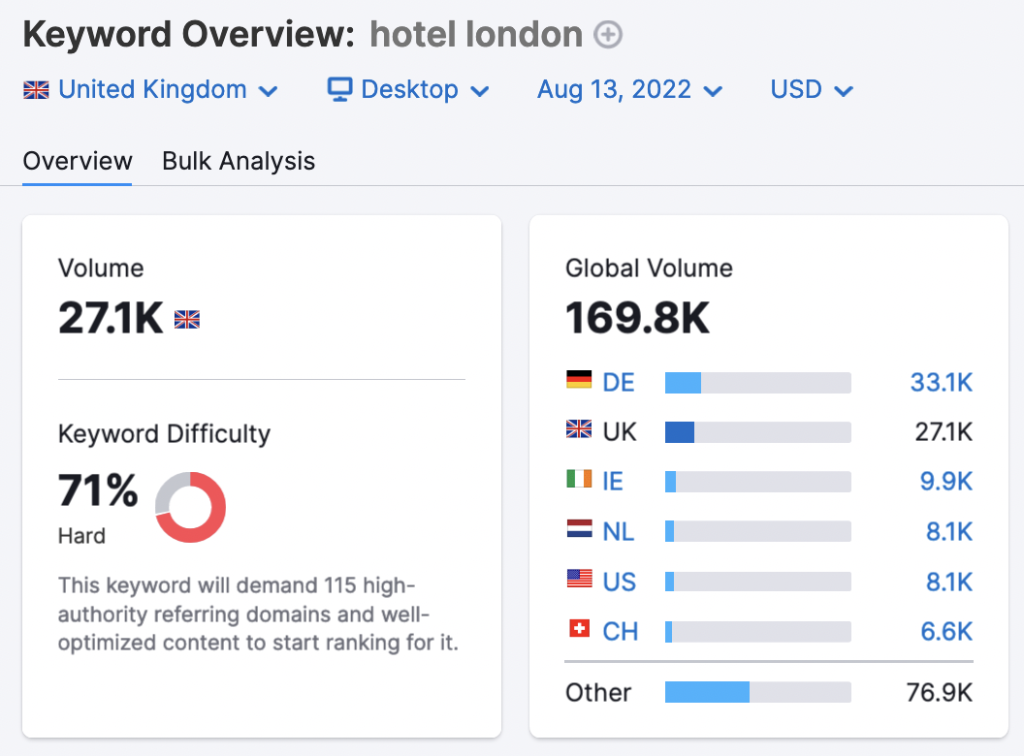
SEMrush tells us that this keyword is searched 169,800 times per month, and that it will be extremely difficult to rank for it.
Between OTAs, travel and hotel websites, there are thousands of pages competing for this keyword. However, there are only 10 spots on the first page of Google.
Instead, let’s drill down into the unique offerings of our hotel and try to find a less competitive keyword to target. Let’s imagine that some of the rooms in our hotel have balconies, so we’ll type ‘hotel london balcony’ into the keyword overview search bar.
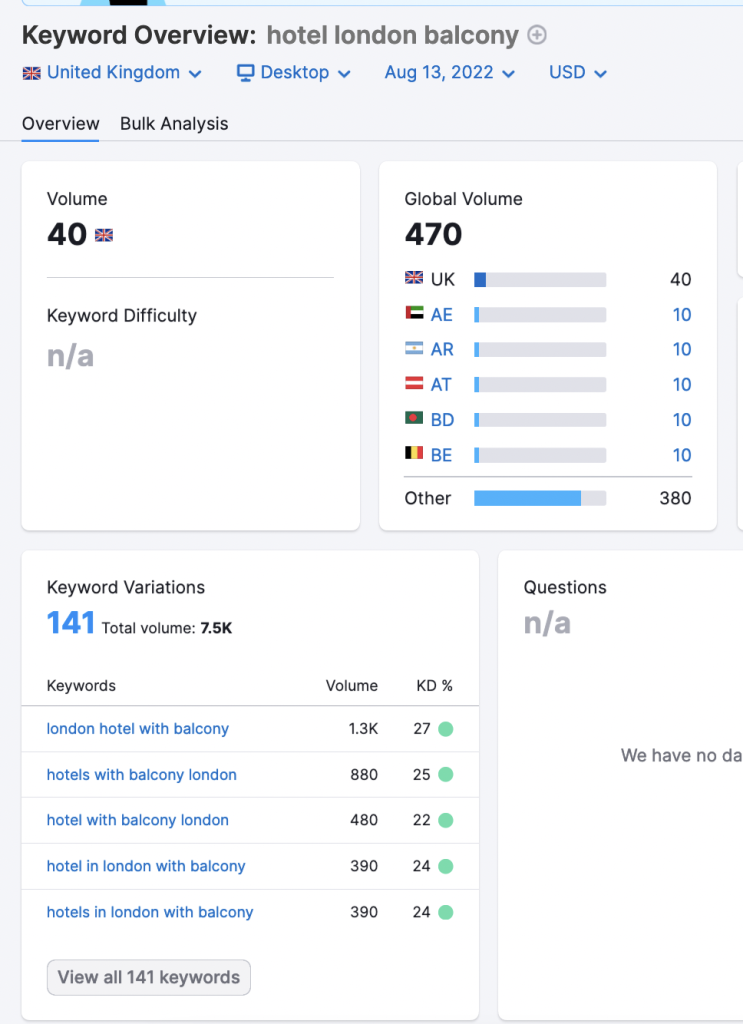
This keyword looks more achievable, but you’ll notice that there isn’t a great search volume: there are only 40 searches per month for this keyword, within the United Kingdom.
However, now that we’ve narrowed down the keyword search, let’s look at the box underneath that says ‘Keyword Variations’. In this box, SEMrush has suggested a handful of other keywords which might be applicable to our query.
There’s one that immediately catches my attention: ‘london hotel with balcony’. The keyword variations box shows us that this keyword has 1300 searches per month, and a difficulty score of 27. Let’s click through to the overview for this keyword:
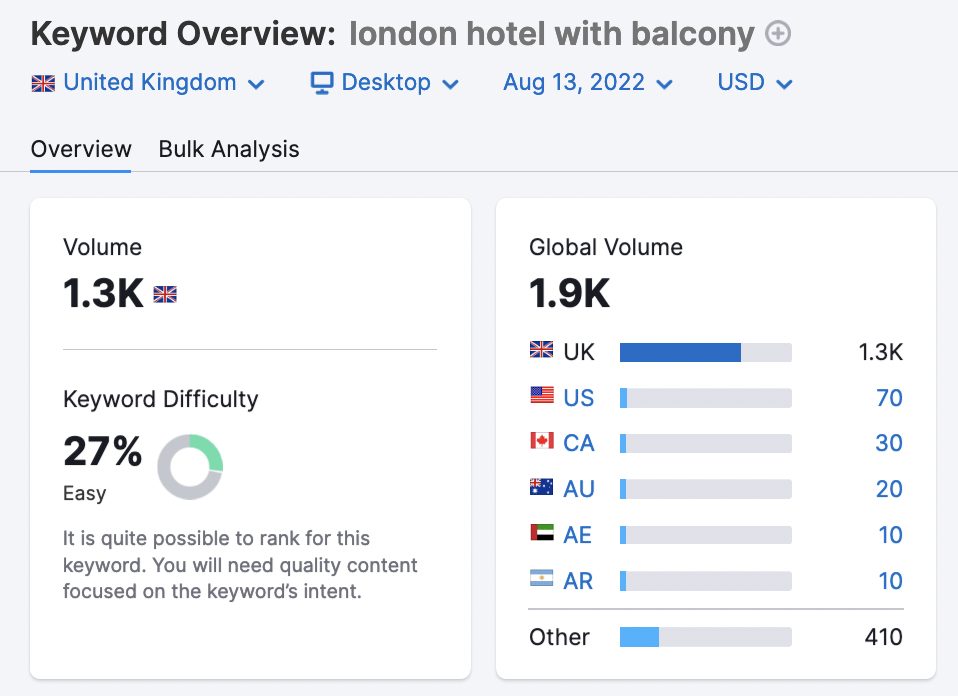
Now we have an example of a great long-tail keyword. It has a high search volume (1300 searches per month in the UK), and a difficulty that’s low enough for our hotel to have a chance of competing. Let’s take a look at the organic results for this keyword within SEMrush:
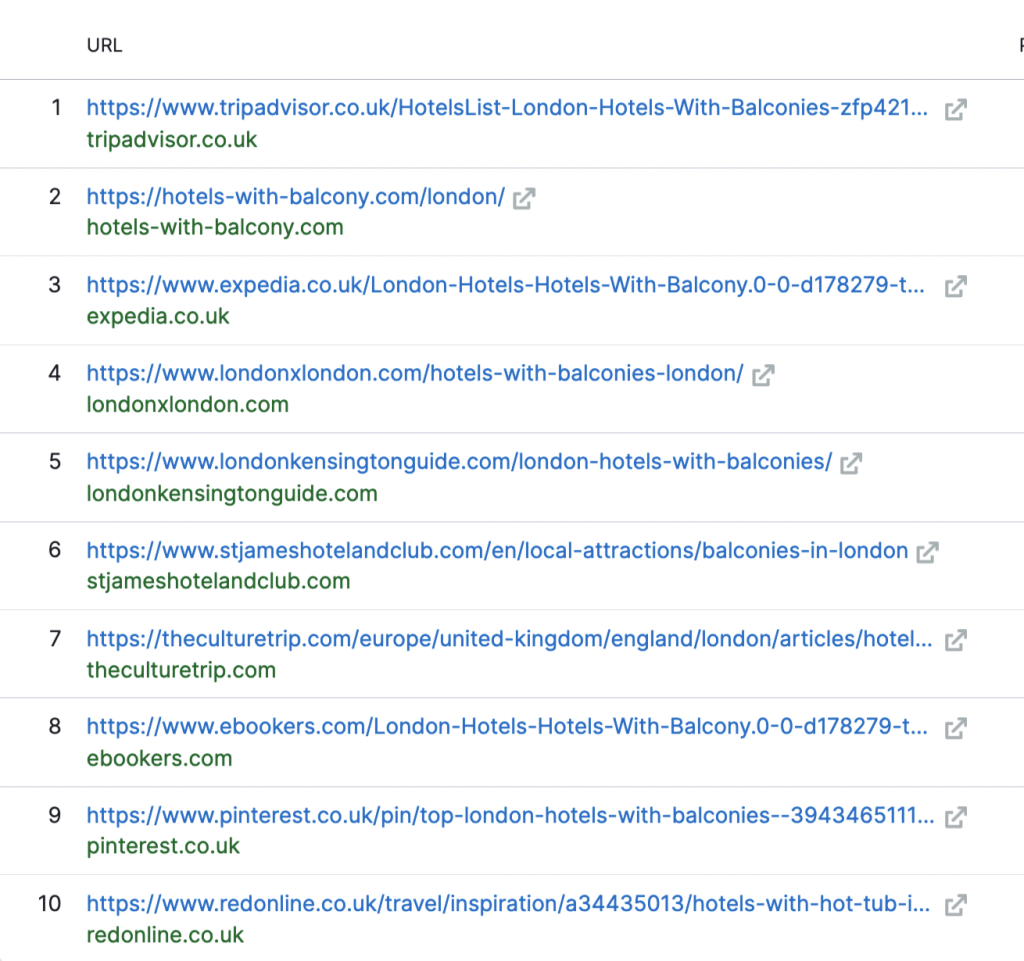
While there are results from the likes of Tripadvisor and Expedia in the top 10, there’s also a number 6 result from St. James’s Hotel & Club, who have created a landing page based around the keyword.
Step 3: Create optimized landing pages
If we click through to this result, we can see that this hotel has created a dedicated page targeting the keyword london hotel with balcony. The text on their page contains a variation of the keyword near the top of the page (‘hotels rooms in London with balconies’) and they’ve also mentioned the word balcony at least two other times in the first three paragraphs.
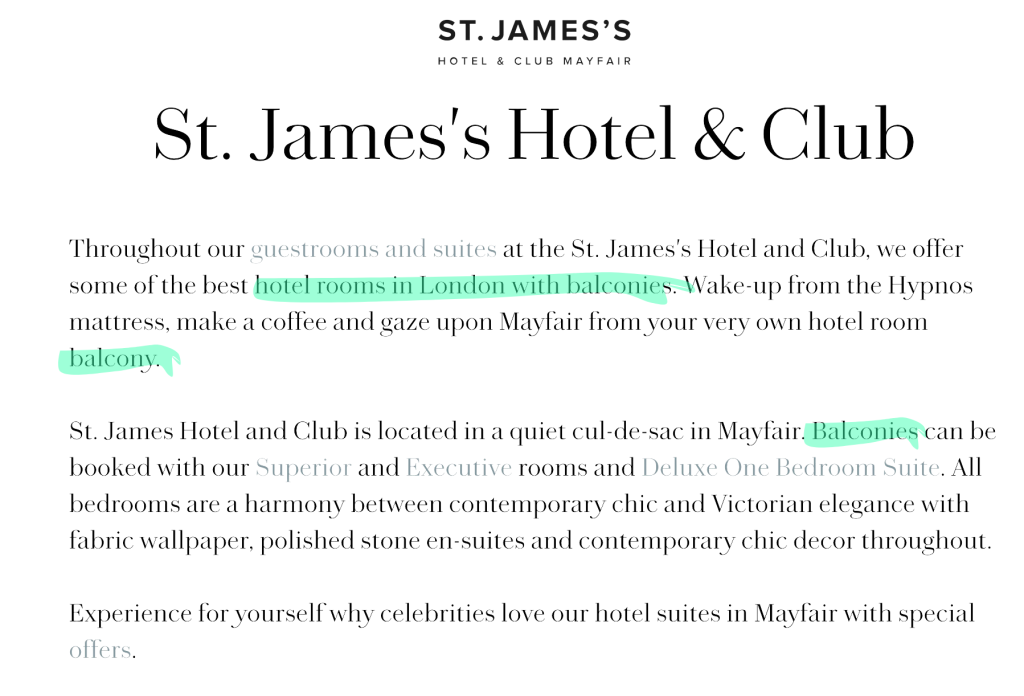
By doing this, St. James’s Hotel & Club have optimized a page on their website for the keyword. and have been rewarded with a number 6 position in the results.
As you can see, an effective way for hotels to achieve success in organic search is to find less competitive long-tail keywords and then to create specific pages on the hotel website that are optimized for those keywords.
I’ve shown how St. James’s Hotel & Club have optimized their landing page by including variations of the keyword on their landing page. This is just one part of a strategy known as on-page SEO, which I’ll explain in the next section.
Interested in how SEO works for luxury travel? Find out in our complete guide!
Optimizing your hotel landing pages
If keyword research can be compared to setting your GPS, on-page SEO is the act of driving the car.
The term ‘on-page SEO’ refers to the task of making your website speak the language of the search engines. Broadly, it is the optimizations that you carry out on your actual website pages.
Solid on-page SEO will help search engines to understand the content that you’ve created around your chosen keywords, and it will also maximize your chances of showing up for branded searches, which is when a user types your hotel name directly into Google.
There are a number of important elements to effective on-page SEO. I like to call these elements ‘spider food’, in reference to Google’s “spiders” or “crawlers” that scan the internet looking for content.
Let’s look at page titles as an example, which are one of the most important on-page SEO elements.
Add title tags and meta descriptions to your pages
Titles are one of the big signals that tell search engines what your page is about, which then helps Google to understand if your page is relevant for a certain keyword.
Therefore, you should make sure that every indexed page on your website has a title. This is done via a ‘title tag’, which is a HTML element inside which your title is written. If you use a content management system like WordPress, your title tag will be generated automatically from the text that you write in the ‘title’ field of your page or post.
Page titles are just one of many ranking factors that go into determining whether or not your page is a relevant match to the search intent of the keyword.

Another important on-page element to consider is the meta description of your page.
We’ve published a full guide to writing meta descriptions for hotels, so for the purposes of this post, let’s keep it short and sweet:
The meta description is the snippet of text that appears underneath the title on the search engine result pages. It is invisible to the user on the actual page, but visible on the search engine results pages.
While the meta description isn’t a ranking factor itself, it is a useful place to persuade potential bookers to click through to your listing. Having a persuasive meta description will increase your click-through rate (CTA), which is a ranking factor – so it’s important to make sure your page has a convincing meta description that sits between 50 and 160 characters.
Other on-page ranking factors
The next factor to consider is the relevance of your actual content to the keyword.
Does your hotel room listing include all the amenities available in the room? What health and safety protocols do you have in place? Google values high quality pages that fulfill the user’s search intent, so it’s important to have as much information that fulfills the specific search intent as you can.
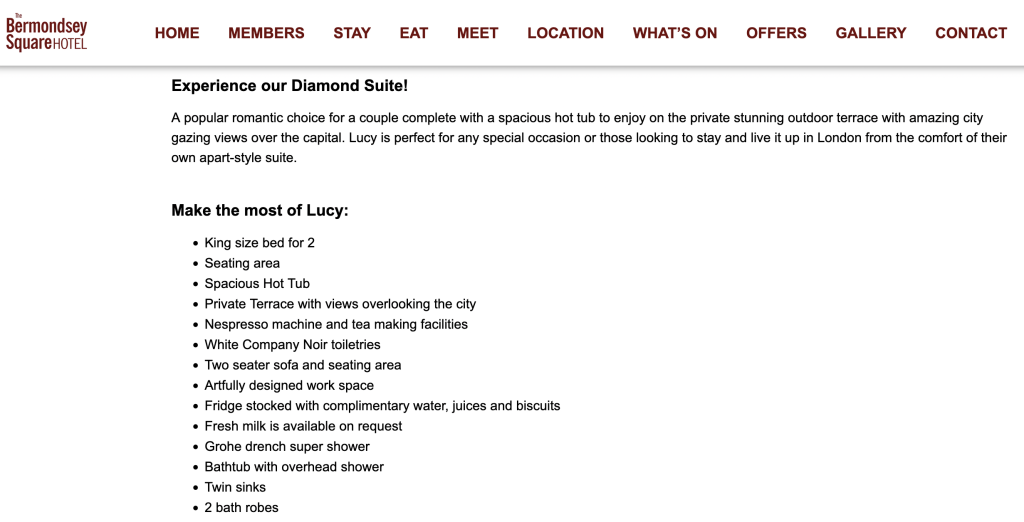
In the screenshot above, you can see how Bermondsey Square Hotel has optimized their page for the keyword ‘london hotel room with private hot tub’ by including references to the keyword and listing all the other amenities available in the room.
This information is displayed in a list format. Google loves lists, because they represent an easy way of understanding and categorizing information. Try to include at least one formatted list on each of your pages, such as a list of room amenities, or a list of attractions near your property.
You’ll also notice that variations of the keyword are weaved into the text naturally, rather than appearing in every sentence.
This is important, because It used to be the case that anybody could rank on Google by including a keyword thousands of times inside the page. Nowadays, thankfully, things are different, and your pages should aim for a keyword density of about 1-2% (that’s roughly 1 to 2 times per 100 words). You can use a free tool like this one to check for keyword density on your pages.
Search engines also look at how your information is organized, for example, by the headings you use on the page. Headings give structure to your page and allow the search engine crawler to understand the level of importance of topics within a page.
Heading tags range from <h1>, the most important, through to <h2> <h3> <h4> and so on. They should be hierarchical, in that you shouldn’t skip from a <h1> tag to a <h4>, and vice versa. It’s also a good idea to include your focus keyword, or a variation of it, within the headings, because this signals to Google that this keyword is important for your page.
Use helpful images on your pages
Images play an important role on your landing pages, not only through the dedicated Google image search (another avenue for potential guests to find your website), but through the way that images are seen and contextualized within your content.
It’s important that each of your pages has at least 2-3 images. For a hotel room page, it’s likely you might want to include more images than this, or perhaps even a gallery.
More images are good, but it’s important to pay attention to another ranking factor called page speed (we’ll cover this later on). Too many images can slow down a page, which can negatively impact your rankings. Here are some other best practices to follow for images:
Use next-gen image formats
JPEG 2000 and WebP image formats are designed to have great web compression, so it’s a good idea to use these file formats for your images. Failing that, formats that retain a good balance of quality vs file size, such as standard JPEG, are the best bet to keep your website loading fast
Include helpful alt text
Every image on your site should have a corresponding alt text, which is a short text that describes the contents of the image. Search engines read the alt text, and screen reader software uses it to read aloud the contents of an image to screen reader users.
Making sure that every image on your site has a short, descriptive alt text that explains the image is good practice for accessibility and SEO. It’s a good idea to include your focus keyword in the alt text where possible, too – but only when it’s natural to do so!
Name your files appropriately
Similarly, each image on your hotel website should have a file name that vaguely describes the content of the image. It should be different from the alt text, and it’s good practice to include a variation of the keyword here.
Compress and resize images for your site
You should ensure that any images you use are compressed to a lower file size, which will allow them to load quicker. For larger images, it’s also a good idea to resize images so that they show properly on both the mobile and desktop versions of your site. Doing this improves the user experience of your website for searchers, which will have a positive impact on your rankings.
Landing page experience
Finally, nowadays on-page SEO might also encompass the UX, or user experience, of your site, which can indirectly affect your ranking.
Search engine results are shifting towards being more user-oriented, and while Google says that they still try to rank pages that have the best information overall, they also say that a good page experience can make the difference in ranking between two competing pages that have similar information and topic coverage.
For hotels, this means making it as easy for guests to be able to book a room on your website in as few clicks as possible. Travelers like OTAs is because they make it easy to book, which is just some of the reason why OTAs pick up the highest rankings for hotel keywords: you should aim to replicate that experience on your own hotel site.
Your landing pages should cater to the needs and wants of your guests, with a tailored experience that makes it simple for them to find the information they need and book the room they want.
How to do local SEO for hotels
Now that we’ve covered keyword research and on-page SEO, it’s time to look at another incredibly important avenue that helps hotels get direct bookings through search.
I’ve written a complete guide to local SEO for hotels, so this post will just touch on the basics.
Local SEO is the branch of SEO that is concerned with optimizing your hotel for local keywords, with the aim of having your property or listing show up on the Hotel Pack for that keyword.
This type of SEO requires a different approach than the website-based techniques that we have spoken about so far. With local, the aim is to optimize your Google Business Profile to show up on the map of local businesses when somebody searches for a location-based keyword (the type that we went through in the section about keyword research). Let’s dig into this some more.
The majority of hotel searches are actually local searches. When somebody types in a keyword like ‘hotels in london’, Google shows a map of hotels above the organic results, with just 4 hotels making it into the featured sidebar.
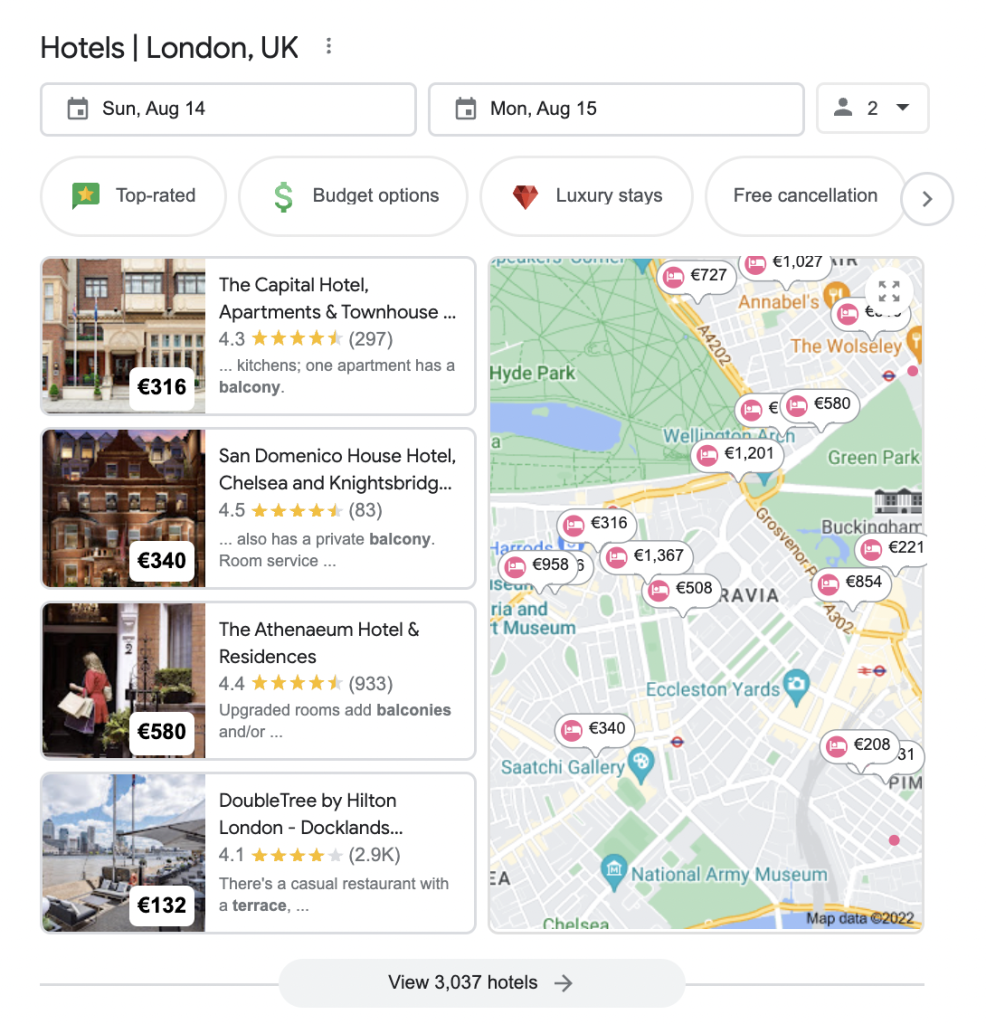
The best way to get your property shown in the Hotel Pack is by optimizing your Google Business Profile for your chosen local keywords and building citations around the internet. I’ll explain both below.
Google Business Profiles for Hotels
Your Google Business Profile (previously Google My Business) is the most important weapon in your local hotel SEO toolkit. It’s this listing that contains all the information about your hotel that Google shows to potential guests when they search for your hotel name, or for a ‘hotel + location’ keyword.
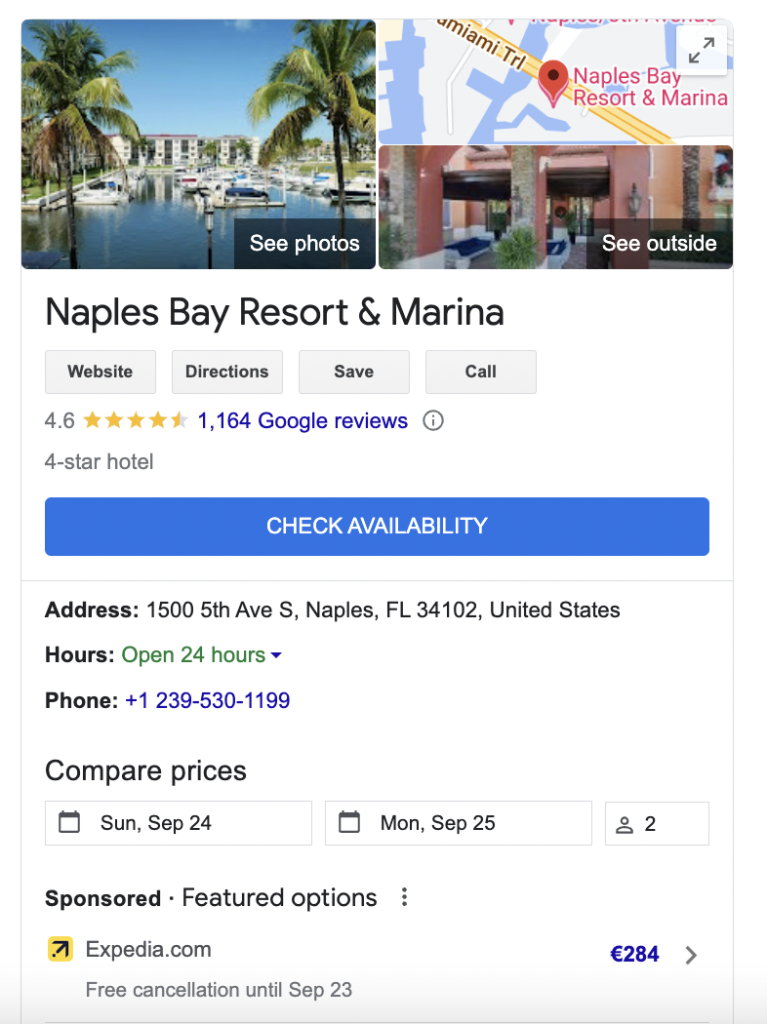
The best chance of appearing in the Hotel Pack is by having a rich and highly optimized Google My Business listing, since the more information Google has about your hotel, the more possibility it has to display your property for searches that might be relevant to it.
For example, if you’ve surfaced a local keyword like ‘hotels with jacuzzi in [city]’, then it’s imperative that you include the fact that you have a jacuzzi within your Google Business Profile, as an an amenity, but also within your service description.
Here is a checklist of the most important tasks to carry out when optimizing your hotel profile on Google:
- Verify your hotel profile with Google (you can follow this guide if you need help)
- Include up-to-date information about your hotel amenities and services
- Upload high quality photos of your hotel (studies have even shown a 225% increase in online bookings for hotels with at least one photograph)
- Add frequent Google Posts to your hotel profile to showcase your unique features
- Encourage and respond to reviews, which are a massive ranking factor for Google
- Respond to and upvote questions in the ‘Q&A’ section
- Update your hotel check-in and check-out times
- Add the sustainability practices followed by your properly
- Add your hotel opening date and make sure any temporary closures are reflected on your profile
- Add booking links (and ensure that the rates displayed on your profile reflect those on your website, since Google calculates a price accuracy score for your hotel)
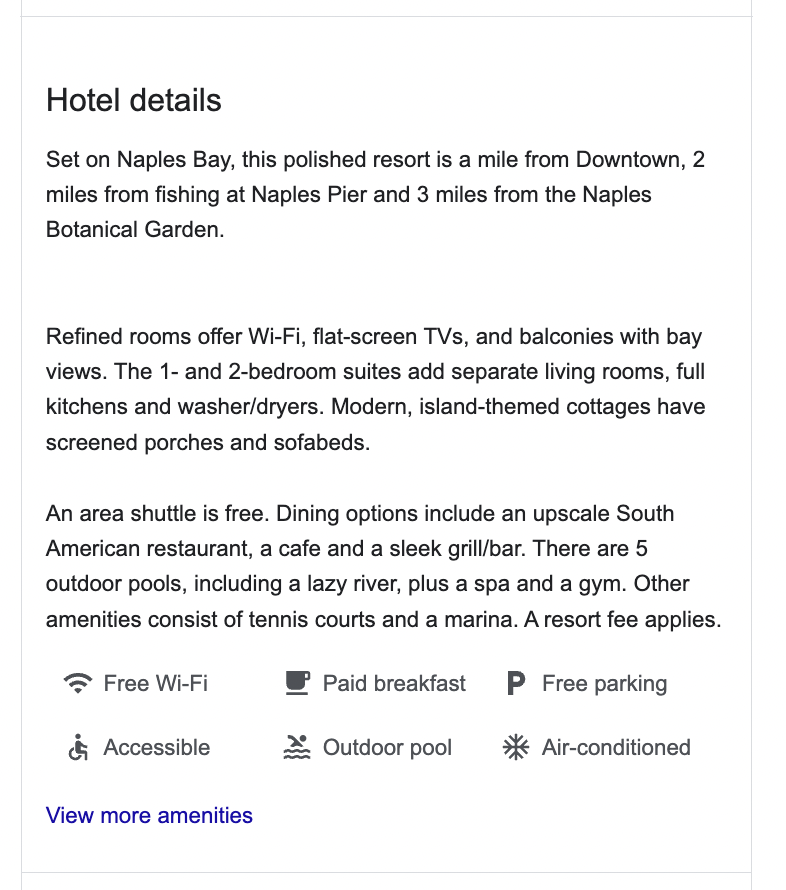
Hotel profiles on Google are slightly much more restricted than normal business listings in terms of the information they can provide. However, the same rule of thumb applies to both.
If every hotel included as much information as possible in their Google Business Profiles, it would become infinitely easier for travelers to find exactly what they want when looking for accommodation. Google rewards listings that do this in the Hotel Pack, because it helps them to help searchers to find the right answer to their query, with as little friction as possible.
Build trust with local directories
While Google Business Profiles are the most important business listings for local SEO, it’s definitely not the only directory on the internet.
To achieve maximum visibility with your local SEO efforts, it’s important to have your hotel website listed on a range of other local directory sites such as Yelp, Foursquare, Apple Maps and Bing Places.
The main benefit of being listed on these directories is not that these directories will bring significant extra traffic to your hotel (although that can be a plus), but that local directory listings are a source of trust, and they allow Google to verify the legitimacy of your business.
Google’s ‘spiders’ are constantly crawling the entire internet, and the more places that your hotel can be found (these are called citations in SEO speak), the more legitimacy is allocated to your hotel.
I recommend spreading out your citation building to a cadence of around 2-3 directories per week for maximum effect on your local listing. This pace will ensure that your citation building is natural, and that you can keep track of the various directories that you’ve submitted to, which is an important part of a concept called NAP consistency.
Why NAP consistency is important
One of the key aspects of local directory citation building is ensuring that the name, address and phone number (NAP) of your hotel are exactly the same across all directories. This is called NAP consistency, and getting it wrong (consistently) can be the difference between a first and a second page ranking.
As I’ve mentioned, the information that Google finds about your business around the internet is used to verify the legitimacy of your hotel. If there’s conflicting information on different parts of the web – for example, your hotel phone number was changed or your address was entered incorrectly on a certain directory – then the search engine has a harder time understanding whether the information about your hotel is correct, and this can hurt your local rankings.
A good tip for citation building is to go to your Google Business Profile and copy and paste your hotel name, address, phone number, and any other information that might be relevant into a ‘master’ document, like this:
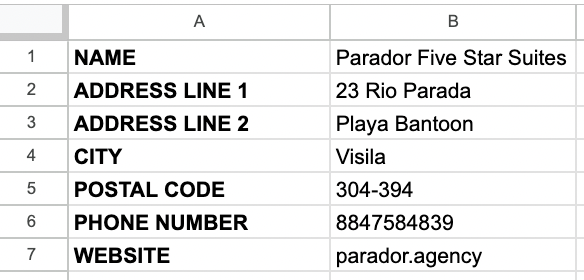
Whenever you submit your hotel to a new directory, copy and paste this information directly from your master document. This way, your NAP information will remain consistent between your Google Business Profile and each and every directory.
You then need to keep track of every directory that your hotel is submitted in, including your login info for those directories, so as to avoid duplicate citations and to allow you to make changes later down the line.
This is difficult work, which is why we offer bespoke local SEO services for hotels that include citation building and NAP consistency alongside our standard Google Business Profile audit, optimization and local keyword research services.
Show your business to interested travelers
Our Local Visibility package drives exponentially more bookings from local search to your business, month-on-month, year-on-year.
Find out howBacklinks and off-page SEO
Off-page SEO refers to tasks and actions you can take on other websites, with the aim of optimizing your website for specific keywords.
The most important type of off-page SEO is called link building (it’s so important that we’ve written an entire guide to hotel link building). Link building is the process of acquiring links, known as backlinks, from other websites to your own.
Backlinks remain an important ranking factor in 2023. If your domain has lots of high-quality (read: domains that also have lots of backlinks) backlinks pointing to your website, your website will be considered more authoritative, which will increase your chances of ranking for your chosen keywords.
Asking for links, or link exchanges, is frowned upon by Google, so your link building efforts should be natural and focused on your industry. Here are some ideas to help build backlinks to your hotel website:
1. List your accommodation with tourism boards
Tourist board websites are a potential unique backlink opportunity for hotel websites, because they often have a high domain authority themselves.
For example, the Visit Portugal website is the official web resource for tourism in Portugal, and features a list of accredited accommodations on their website. Listing your hotel on their site provides a potentially lucrative boost to your own SEO authority, because they have an extremely strong online presence themselves, with 893,000 unique backlinks pointing to their site.

2. Pitch guest posts about your destination
Guest posting is one of the most common forms of link building. In a nutshell, it involves writing content to be published on somebody else’s website. The content is then published as a guest post, under your name, with a link back to your website.
A good guest post should leverage the expertise of the writer in order to deliver compelling insights into the chosen topic. Some example topics for hotel guest posts could be:
- The future of boutique travel in [x] destination
- How your destination is uniquely positioned to offer certain experiences
- The hotel landscape in your destination post COVID-19
Finding relevant publishers to pitch guest posts to can be challenging. As a rule, the higher DA (domain authority) that the publisher has, the more valuable the guest post will be to your overall SEO efforts. Naturally, these publishers tend to be the ones that receive the most pitches, so it can be harder to secure a guest post with them.
That being said, even backlinks from low and medium DA sites will help your site become ‘trusted’ in the eyes of Google – especially if the site linking to yours has a similar topical focus as your own (this is known as link relevance).
You can use Google itself to find guest post opportunities for your hotel. Try some of the following keywords to find websites that will accept guest posts relevant to you:
- hotel guest posts blog
- “write for us” hotel industry
- [your destination] guest post blog
The most common types of publishers for hotel guest posts are travel blogs, local magazine websites and hotel industry blogs. It’s important to always keep the target audience of your publisher in mind, while imparting your unique expertise. As with your own content, your main aim should be to provide value to the site you’re publishing on. When carried out with the right ethos and expertise, guest posting can be a win-win situation for both hotel and publisher.
3. Write a blog on your hotel website
Writing blog content isn’t an off-page SEO technique per se, but it is definitely a viable strategy to acquire links for your hotel website.
If you write great content around low difficulty, long-tail keywords, backed up by solid on-page SEO, then you may find yourself ranking on the SERPs for these keywords without having to build backlinks. By doing this, you make your website visible to other publishers who might be doing research: if your content is informative and helpful, those publishers may naturally link back to your site.
With this method, you will find yourself naturally acquiring backlinks from other sources, which will help build the domain authority of your hotel website and help you rank for more competitive keywords in the long-term.
Writing blog content also helps you rank for your own keywords, which can bring in traffic from travelers who may be interested in booking on your site. We’ll explore this in the next section on hotel content marketing.
SEO content marketing for hotels
Content marketing is the part of hotel SEO that I feel is the most overlooked.
It involves creating content around keywords related to things to do in your destination.
For example, the keyword ‘coffee shops vienna’ has a search intent for a list of the best coffee houses in Vienna. Somebody searching for this keyword is very likely to be traveling through Vienna on a holiday or business trip, so hotels can use these kinds of blog posts to drive traffic to their website and insert calls-to-action (CTAs) such as discounts, offers and room booking links.
For example, one of the top ranking pages for ‘coffee shops vienna’ comes from hostel accommodation provider St. Christopher’s Inns, who have inserted a CTA to ‘search for beds’ in the bottom right corner of their blog post:
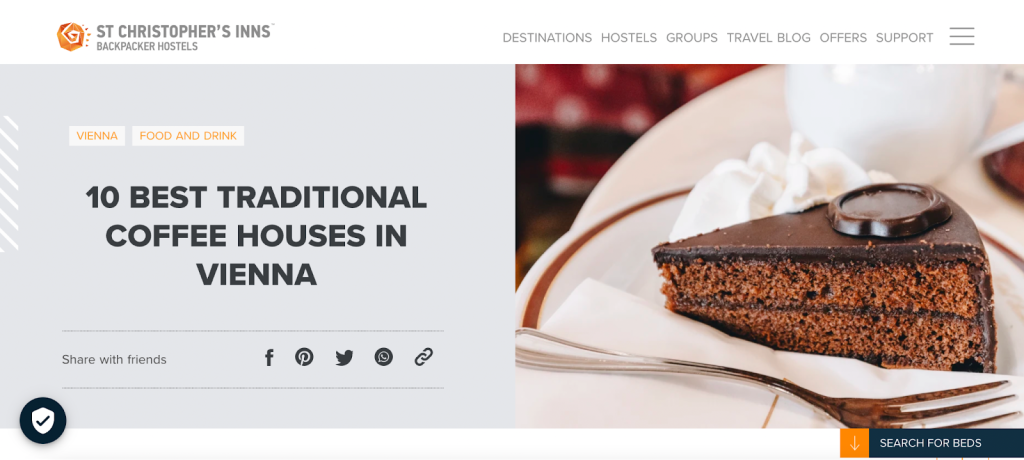
This type of marketing is known as content marketing, and it goes absolutely hand-in-hand with SEO. In fact, a good content marketing strategy built around relevant keywords can supercharge your entire hotel SEO strategy, and help you bring incremental bookings while securing higher rankings for your main keywords.
The best way to get ideas for destination keywords? Speak to your guests! Travellers usually have a set itinerary in mind of what they want to do on their holidays. Keep an ear out for their requests: are they looking for local restaurants, coffee shops, bars, museums? Use this information to draft up a list of potential keyword searches to build content around.
A great content marketing strategy will then use these keywords as a base to craft exceptional, in-depth content that provides valuable information and insights on your destination. After all, you’re the expert!
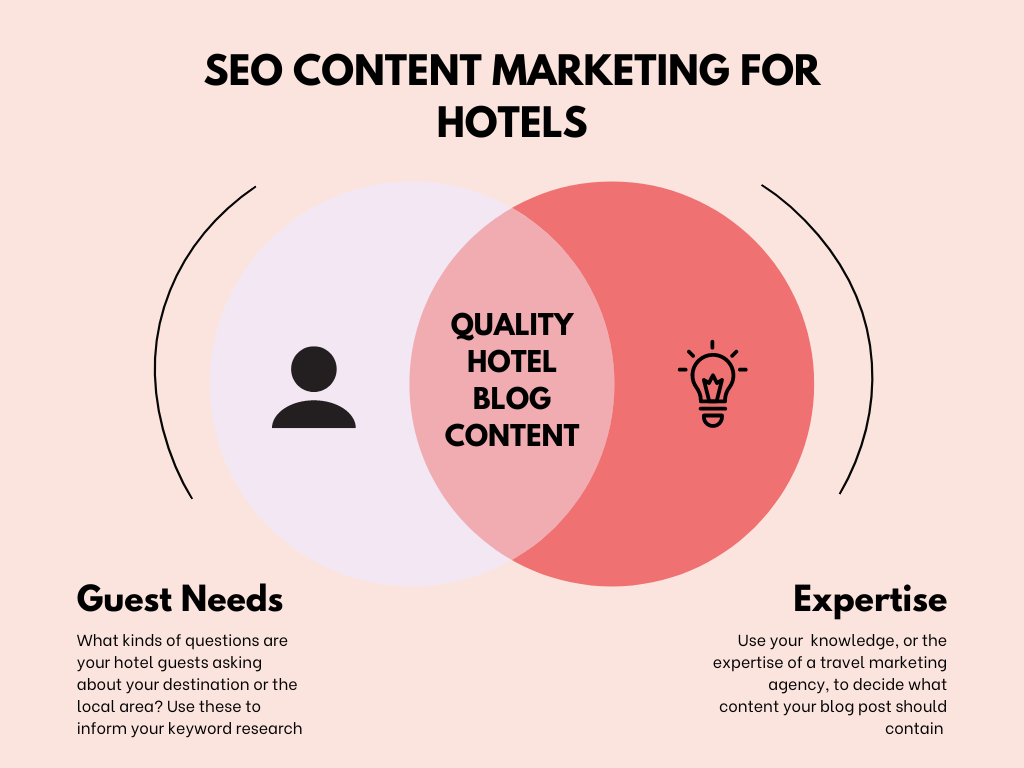
Content like this also increases the authority of your site on its chosen topic, which in a hotel’s case is your destination. This kind of authority-building is known as clustering, which is the best way to help you rank in the long-term for the main keywords around your hotel.
Content built around destination keywords can also show up in other places around the web, such as Google Travel, a trip itinerary planner which launched in 2019.
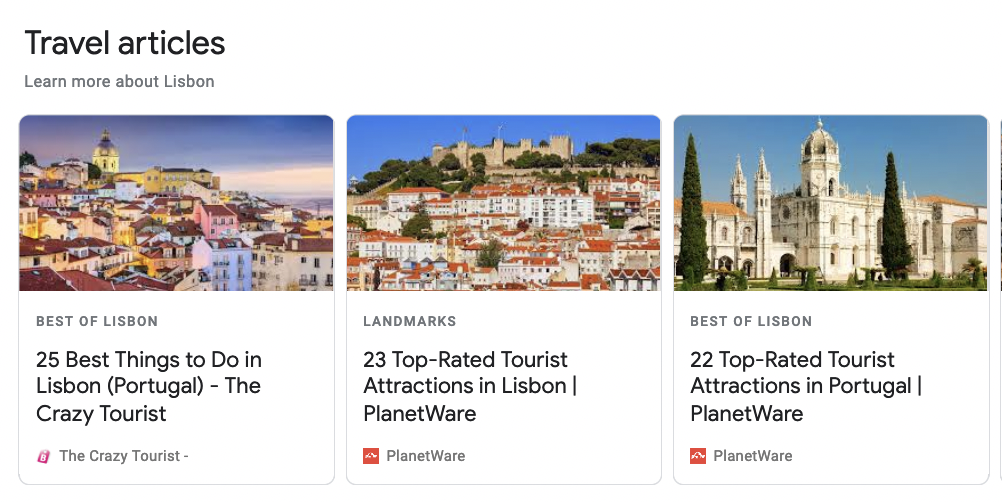
If you need help with travel content marketing, click through to find out about our Travel Content Pro services, a specialized end-to-end SEO travel content service designed to supercharge the traffic to your hotel website from search.
Get direct bookings through SEO content
Outrank the OTAs and fill your calendar with direct bookings using Travel Content Pro, our end-to-end SEO content marketing service.
Pricing PlansTechnical SEO strategies for hotels
Technical SEO is all about making sure that your website, technically speaking, is up to the standards of search engine crawlers. Web crawlers need to be able to access, read and index your website easily, and the process of helping them to do that is known as technical SEO.
Good technical SEO is paramount for the success of your search engine strategy. Without good technical SEO, your content can’t be found, crawled or indexed by Google.
While technical SEO is not the first thing that a hotel website should focus on, it’s important to get it right early: bad technical SEO can cause big problems later down the line, whereas good technical SEO is that small thing that could make the difference between the first and second spots on the SERPs.
Here are the most important technical SEO tasks for your hotel website:
- Maintain a fast and responsive website, with good Core Web Vitals, by having fast hosting, compressing images and using speed-optimized themes
- A functional mobile website that offers mobile check-in (you could even reserve this option for those who book directly on your site or are part of a loyalty program, which will help beat the OTAs)
- A low click depth (how deep a page is within your site) to your main booking pages
- A straight-forward URL structure: you could have separate sections for your rooms (myhotel.com/rooms/), a section for bookings (myhotel.com/bookings), a section for your blog (myhotel.com/blog/), and any other specific section within your site.
- Short URLs: rather than myhotel.com/2022/special-offers/balcony-rooms-with-a-view/room2, opt for a simpler URL structure, such as myhotel.com/rooms/balcony-room-2/
- Submit a sitemap, which is a file that lists out all the pages on a website in a way that makes it easy for search engine crawlers to understand them. Your site probably has one – add /sitemap.xml to the end your URL and see!
- If you use a CMS like WordPress, you can use free plugins such as RankMath or Yoast to create a sitemap. Otherwise, use a free online sitemap generator to generate yours.
- Once your hotel website’s sitemap is ready, submit it to Google via Google Search Console, and wait for it to be indexed.
- Make sure that each page is assigned its own keyword, and that you don’t have multiple pages targeting the same keyword (keyword cannibalization)
- Implement a logical URL structure (give an infographic for travel sites) that clearly indicates the topical relationship between categories, subcategories, posts and pages
- Use proper internal linking to show which pages are most important
- Retain a solid pagespeed by having fast hosting, compressing images and using speed-optimized themes, if your site is built using a CMS
Technical SEO is about keeping your website healthy, crawlable, and easy to navigate. To make sure your site is operating at its full potential, you can look for a deep-dive travel SEO audit service such as the one we offer at Parador, which will tell you exactly what needs fixing on your site and how to do it, so that your team can ‘plug the holes’ and make sure you are maximizing your site’s booking potential from search.
Stay ahead of the curve with hotel SEO
As we’ve explored, SEO for hotels has lots of moving parts, but went tackled together with a solid strategy it can be instrumental in driving direct bookings from your hotel or accommodation website.
If you’re serious about driving direct bookings to your hotel through SEO, you can fill out our form to apply to work with Parador on a custom strategy for your business. We currently have capacity for three more clients in 2023, and successful applicants will hear back within one working day.

